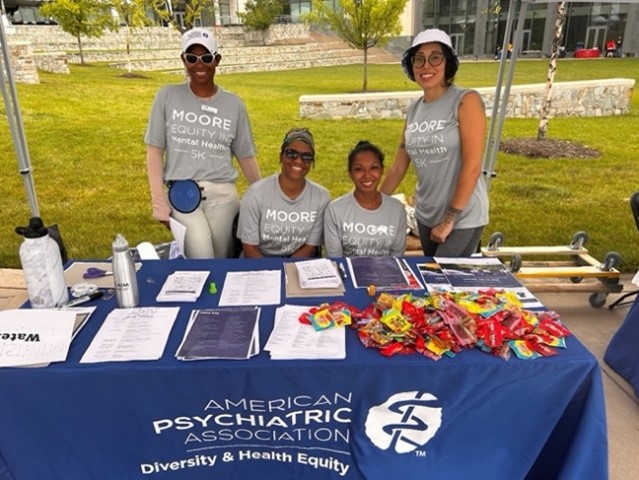Elevating Bebe Moore Campbell's Legacy in 2023: APA's Dynamic Approach to National Minority Mental Health Awareness Month
Part 1
The Need to Raise Awareness: Continuing Disparities
In July American Psychiatric Association (APA) embarked on its annual effort to honor of the late renowned author and mental health advocate, Bebe Moore Campbell. Established by Congress in 2008, Bebe Moore Campbell National Minority Mental Health Awareness Month is a call to action and reminder of the mental health inequities affecting communities, and in particular, young people of color. This month-long recognition is especially important considering the prevalent mental health inequities facing youth of color, particularly Black youth.

While some young people of color experience lower rates of lifetime mental health disorders, their disorders tend to have a more chronic course. These youth, in addition to their racial and ethnic identity, have other identities with which they must contend, related to socioeconomic status, documentation status, sexual orientation, gender identity, and cognitive and physical ability status.1
Young people of color often have less access to mental health resources (e.g., financial, coverage, and cultural barriers) and receive lower quality mental health care than white youth, although they experience discrimination and violence at higher rates.2-5 A particularly alarming trend is the upward trajectory of suicide rates among Black youth in the U.S., which is escalating at a more rapid pace compared to other racial groups.6
APA’s 2023 MOORE Equity in Mental Health Initiative
Each July, APA joins with mental health organizations around the U.S. to address these inequities and honor the work of Bebe Moore Campbell. APA does this by raising awareness and connecting communities to mental health resources through a series of impactful events known as APA’s MOORE Equity in Mental Health Initiative (MEMHI).
MEMHI began in 2021 with a 5K Run, Walk, and Roll fundraiser aimed at supporting non-profits focused on enhancing mental health for youth of color. 2023 marked an evolution with the addition of an inaugural Youth Mental Health Summit, 2nd annual Community Mental Health Fair, and a series of mental health roundtable conversations. Events, led by APA’s Division of Diversity and Health Equity, came to fruition via key partnerships, including this year’s Grand Marshal, Jay Barnett – a former professional football player turned therapist and author, who specializes in connecting with Black communities to normalize conversations around mental health. Learn more about the initiative.
Kick Off with A Roundtable Conversation on Maternal Mental Health

Featuring Diana Ramos, M.D., California's surgeon general, and Dionne Hart, M.D., APA member psychiatrist, APA kicked off the MEMHI with a session focused on the impact of severe maternal morbidity and mortality on families of color. The current maternal health crisis in the U.S. disproportionately impacts non-Hispanic Black and American Indian and Alaska Native (AIAN) birthing persons, who are three to four times more likely to experience birth-related deaths and severe maternal morbidity (SMM). Birthing persons who have experienced SMM are at an increased risk of developing postpartum mental health conditions, including depression, and are prone to other psychological distress symptoms, which can culminate in post-traumatic stress disorder (PTSD).7-9
In California, Dr. Ramos has made mental health and health disparities priority points. During the roundtable discussion, she called for tailored solutions and community-driven interventions to bridge these glaring gaps. “It is critically important to listen to community voices... you cannot have a one-size-fits-all solution,” said Dr. Ramos. Watch a recording of the Roundtable.
Partnering with Maryland’s Largest HBCU for APA’s MOORE Equity in Mental Health Community Fair
On July 8, APA held its second annual MOORE Equity in Mental Health Community Fair, this year in partnership with Morgan State University (MSU)’s Center for Urban Health Equity in the School of Community Health. The fair provided community residents with mental health information and resources and connected them to mental health services and organizations.

Approximately 40 mental health and social services organizations tabled on the lawn in front of MSU’s Earl G. Graves School of Business and Management under the shade of pop-up tents and the backdrop of workshops, music, games, prizes, and food. The event began with opening remarks from APA Deputy Medical Director and Chief of Diversity and Health Equity, Regina James, M.D., Baltimore City District 46 Delegate Robbyn T. Lewis, and MEMHI Grand Marshal, Jay Barnett.
In speaking about why being Grand Marshal was an honor, Barnett emphasized the importance of community mental health work and ensuring mental health parity because “mental health is life in motion.”
Meanwhile, Dr. James made it clear that partnering with MSU highlighted the importance of psychiatric work in bringing awareness to and advocating for education and resources around mental illness and substance use disorders, particularly for communities of color. With diverse organizations participating, the fair provided a supportive environment for crucial conversations with community members. Read more about the community fair.
By Veronica Handunge, M.P.H.
On behalf of APA's Division of Diversity & Health Equity
Contact the APA MOORE Equity in Mental Health Initiative at [email protected].
Read Part two of this blog covering the Youth Leadership Institute and 5k.
References
- APA Working Group for Addressing Racial and Ethnic Disparities in Youth Mental Health. (2017). Addressing the Mental Health Needs of Racial and Ethnic Minority Youth: A Guide for Practitioners. American Psychological Association: PsycEXTRA Dataset. https://doi.org/10.1037/e502532017-001
- U.S. Dept. of Health and Human Service, Office of Population Affairs, Access to Adolescent Mental Healthcare.
- Youth.gov. Prevalence of Mental Health Disorders Among Youth.
- Barksdale, C. L., Azur, M., & Leaf, P. J. (2010). Differences in mental health service sector utilization among African American and Caucasian youth entering systems of care programs. The journal of behavioral health services & research, 37(3), 363–373. https://doi.org/10.1007/s11414-009-9166-2
- Substance Abuse and Mental Health Services Administration. Behavioral Health Equity
- Stone DM, Mack KA, Qualters J. Notes from the Field: Recent Changes in Suicide Rates, by Race and Ethnicity and Age Group — United States, 2021. MMWR Morb Mortal Wkly Rep 2023;72:160–162. DOI: http://dx.doi.org/10.15585/mmwr.mm7206a4
- Canty, L. (2022). The lived experience of severe maternal morbidity among Black women. Nursing Inquiry, 29(1), e12466. https://pubmed.ncbi.nlm.nih.gov/34636106/
- Declercq, E., & Zephyrin, L. (2021). Severe Maternal Morbidity in the United States: A Primer. The Commonwealth Fund: New York, NY, USA.
- O'Neil, S., et al. (2021). The high costs of maternal morbidity show why we need greater investment in maternal health. Mathematica Policy Research
